Wednesday, May 4, 2022 at 11 p.m. on KPBS TV / On demand with KPBS Passport!
—Explore the Extinction Crisis and Its Consequences, Including Greater Risk of Global Pandemics—
Featuring some of the world’s leading scientists, “Extinction: The Facts” is an up-to-the-minute report on what extinction and biodiversity loss mean, not just for the planet, but for us as a species. Presented by Sir David Attenborough, the program reveals how this crisis has grave consequences for us all—threatening food and water security, reducing our ability to control our climate, and putting us at greater risk of deadly pandemic diseases, including COVID-19.
It reveals what is happening to the natural world, how human activity drives extinction, and why we haven’t acted sooner to stem these losses. With the world at a critical turning point, “Extinction: The Facts” asks what governments, industries and individuals can do now to change our course. In 2019, the United Nations asked over 500 scientists across the globe to investigate the current state of the natural world. They found that biodiversity is being lost at rates never seen before in human history.

One million plant, insect and animal species are now threatened with extinction at a rate at least 100 times faster than the natural evolutionary rate. As the program reveals through the story of the last two remaining Northern White Rhinos, the results can be heartbreaking.
But the crisis is about more than the loss of individual species. The evidence shows that the collapse of biodiversity now threatens our own wellbeing. We are losing many of the services that nature provides for us — the loss of insects puts pollination and food production at risk, the loss of biodiversity in the soil threatens plant growth. Plants themselves underpin almost everything that we need, yet one in four plants that have been assessed are currently threatened with extinction.

“Extinction: The Facts” examines the many ways that humans are driving this loss of biodiversity. The illegal wildlife trade, overfishing, climate change, pollution and land-use change are all threatening our world’s delicate balance. This destructive relationship with the natural world is linked to the rise of pandemics, as seen in diseases transmitted from animals to humans such as Ebola and coronaviruses like SARS and COVID-19.

As the world’s nations envision a post-pandemic future, many are asking what can be done to stop the loss of biodiversity and make the planet a safer place for all its inhabitants. The evidence is that nature can bounce back if the right choices are made at this critical moment.

When Sir David visited Rwanda’s mountain gorillas 40 years ago, they were on the brink of extinction, with only around 250 individuals left. But decades of effort from conservationists, governments and the local community turned the tide, and there are now over 1000 mountain gorillas — including descendants of those Sir David met.
“Over the course of my life, I’ve encountered some of the world’s most remarkable species of animals,” said Sir David Attenborough. “Only now do I realize just how lucky I’ve been. Many of these wonders seem set to disappear from our planet forever. We are facing a crisis and one that has consequences for us all, but it’s not too late. I truly believe that together we can create a better future, if we make the right decisions at this critical moment.”

Watch On Your Schedule:
This film is now on demand with KPBS Passport, a benefit for members supporting KPBS at $60 or more yearly, using your computer, smartphone, tablet, Roku, AppleTV, Amazon Fire or Chromecast. Learn more and activate your benefit now.
Credits:
The series produced and directed by Serena Davies. The BBC Commissioning Editor is Jack Bootle. The film is edited by Stephen Moore. Helen Thomas is the executive producer. Executive in charge for PBS is Bill Gardner. The film is a BBC Studios production for PBS and BBC.





